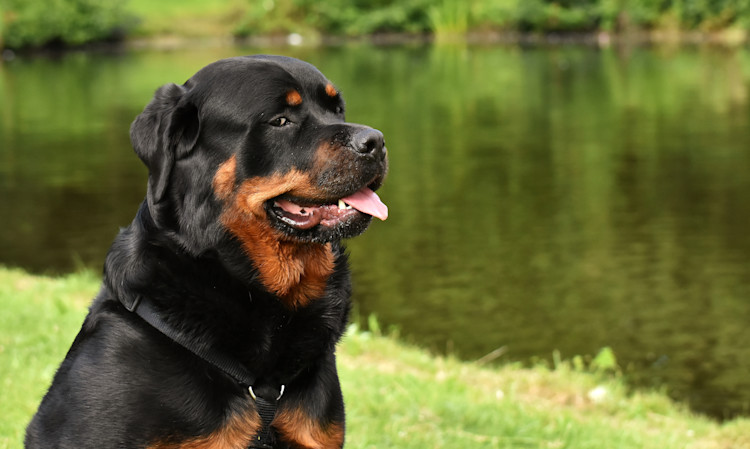So, you’re curious about how old a 5-year-old Rottweiler really is? Well, let’s dive right into the fascinating world of canine aging! 🐶💨
Picture this: it’s a sunny day, and you’re in a park, surrounded by playful dogs of all shapes and sizes. Suddenly, you see a majestic Rottweiler prancing around, oozing irresistible charm and that unmistakable characteristic confidence. You can’t help but wonder, “How old is this glorious creature?”
Well, my young friend, a 5-year-old Rottweiler is considered to be in the prime of its life. In dog years, they’ve hit the equivalent of their early 30s! They’re like the cool young adults who still have boundless energy and a zest for life. Talk about being at the height of their powers! But what exactly does it mean in terms of dog years? Keep reading to find out!

How Old is a 5-Year-Old Rottweiler?
Welcome to our comprehensive guide on the age of a 5-year-old Rottweiler! If you’re a proud Rottweiler owner or considering getting one, understanding their age is essential for their care and well-being. In this article, we’ll delve into the intricacies of a 5-year-old Rottweiler’s age, including their physical development, behavior, and health considerations. Let’s get started!
Physical Development of a 5-Year-Old Rottweiler
In their fifth year, Rottweilers have typically finished their growth phase. By this age, they have reached their full height and weight, with males generally weighing between 95-135 pounds (43-61 kg), and females weighing slightly less at 80-100 pounds (36-45 kg). Their height typically falls within the range of 22-27 inches (56-68 cm) at the shoulder. While individual variations exist, these general measurements provide a good idea of what to expect.
At this stage, their body has become muscular and well-defined. Their chest is broad and deep, their neck strong, and their back straight. Their head is broad with a well-pronounced muzzle and powerful jaws. The Rottweiler’s coat is dense and short, providing protection and warmth in various climates. It typically features a black base with rust-colored markings on the cheeks, eyebrows, chest, legs, and beneath the tail.
Even though a 5-year-old Rottweiler is considered fully grown, they may still undergo changes in muscle tone and weight distribution. Regular exercise, appropriate nutrition, and proper care are essential to maintain their physique and overall health. Now that we’ve covered their physical development, let’s explore their behavior and temperament.
Behavior and Temperament of a 5-Year-Old Rottweiler
At 5 years old, Rottweilers have matured both physically and behaviorally. They have moved beyond the puppy stage and have settled into their adult temperament. Rottweilers are known to be confident, loyal, and protective, making them excellent family companions and working dogs.
By this age, Rottweilers have developed a strong bond with their owners and are deeply devoted to their families. They exhibit a calm and self-assured nature, but their protective instincts may still be present. Early and consistent socialization is crucial to ensure they grow into friendly and well-mannered dogs when encountering new people, animals, and environments. Positive reinforcement training methods can help reinforce good behavior and strengthen the bond between the dog and their owner.
While a 5-year-old Rottweiler may have a more settled demeanor, they still require mental and physical stimulation to thrive. Regular exercise, interactive toys, and mental enrichment activities will keep them happy, healthy, and prevent boredom-related behaviors. Remember, a tired Rottweiler is a well-behaved Rottweiler!
Health Considerations for a 5-Year-Old Rottweiler
As Rottweilers age, it’s important to be aware of certain health considerations. While they are generally a robust and healthy breed, they are predisposed to some genetic conditions. Regular veterinary check-ups and preventive care play a crucial role in ensuring their well-being.
One common health concern for Rottweilers is hip and elbow dysplasia. These conditions occur when the joints don’t develop correctly, leading to discomfort, lameness, and mobility issues. Regular exercise, a balanced diet, and weight management can help minimize the risk and severity of these conditions. Other health concerns include heart disease, certain types of cancer, and eye conditions.
Dental hygiene is also vital for a 5-year-old Rottweiler. Regular dental care, including brushing their teeth and providing appropriate chew toys, can help prevent periodontal disease and maintain healthy teeth and gums.
Lastly, as Rottweilers age, it’s important to keep a close eye on their weight and overall condition. Obesity can lead to various health issues and increase the risk of joint problems. A well-balanced diet, portion control, and regular exercise will help maintain their optimal weight.
Beyond 5 Years: Further Stages of a Rottweiler’s Life
As your Rottweiler goes beyond their fifth year, you can continue to provide the care, love, and attention they need. Regular veterinary check-ups, a healthy diet, exercise, and mental stimulation will promote their overall well-being. Be sure to monitor any changes in behavior, appetite, or physical condition and consult your veterinarian if you have any concerns.
Training Tips for a Happy and Well-Behaved Rottweiler
Training is a crucial aspect of a Rottweiler’s life. Here are some training tips to help ensure your Rottweiler is well-behaved and happy:
- Start training early: Begin training and socializing your Rottweiler from a young age to establish good behavior and manners.
- Use positive reinforcement: Reward-based training methods work best with Rottweilers. Use treats, praise, and toys to reward good behavior and discourage unwanted behaviors.
- Be consistent: Consistency is key when training your Rottweiler. Use the same commands and techniques consistently to help them understand what is expected of them.
- Provide mental stimulation: Engage your Rottweiler in activities that challenge their mind, such as puzzle toys, obedience training, and interactive games.
- Seek professional help if needed: If you encounter specific training challenges or need guidance, consider enrolling your Rottweiler in obedience classes or consulting a professional dog trainer.
Remember, training is an ongoing process, and patience and consistency will yield the best results. Enjoy the journey of training and bonding with your Rottweiler!
Rottweiler: A Life-Long Companion
A Rottweiler’s age should not be the sole focus. Remember to cherish every moment and year you have with your furry companion. With love, care, and proper guidance, your Rottweiler can be a loyal and loving companion for many years to come. Treasure your time together and create a lifetime of memories!
Key Takeaways – How old is a 5-year-old Rottweiler?
- A 5-year-old Rottweiler is considered an adult dog.
- Rottweilers typically have a lifespan of 8 to 10 years.
- A 5-year-old Rottweiler is in the prime of its life.
- At this age, Rottweilers are still energetic and active.
- Proper care and regular veterinary check-ups can help ensure a healthy and happy older Rottweiler.
Frequently Asked Questions
Welcome to our FAQ section on how old a 5-year-old Rottweiler is. If you’re curious about the age of a 5-year-old Rottweiler or have any other questions related to Rottweiler age, we’ve got you covered!
1. How long do Rottweilers usually live?
Rottweilers have an average lifespan of about 8 to 10 years, although some can live even longer with proper care and a healthy lifestyle. The lifespan of a Rottweiler can be influenced by various factors such as genetics, diet, exercise, and overall health. Regular vet check-ups and a well-balanced diet can contribute to a longer lifespan for your Rottweiler.
It’s important to note that every dog is unique, and individual Rottweilers may have different lifespans. While some may live beyond the average range, others may have shorter lifespans due to health issues or other factors.
2. How can I determine the age of my 5-year-old Rottweiler?
To determine the accurate age of your 5-year-old Rottweiler, it is best to consult the dog’s breeder or previous owner, if possible. They should have records that indicate the dog’s date of birth or approximate age. If you’re unsure about the dog’s background, taking them to a veterinarian is the best course of action. A vet can assess various physical indicators such as dental condition, muscle tone, and any age-related health concerns to provide an estimate of the dog’s age.
Keep in mind that the provided estimate may not be 100% accurate, especially if your Rottweiler has a unique health history or not enough background information is available. Remember, age is just a number, and what really matters is providing your Rottweiler with the best care and love regardless of their exact age.
3. Do Rottweilers age differently from other dog breeds?
While all dogs age similarly, there may be slight variations in the aging process between different breeds. Rottweilers are considered a large breed, and larger dogs generally have shorter lifespans compared to smaller breeds. The aging process in Rottweilers might include signs such as decreased energy levels, graying fur, and joint stiffness.
It’s important to note that individual genetics, health, and lifestyle factors can influence how quickly or slowly a Rottweiler ages. Regular veterinary care, a balanced diet, exercise, and maintaining a healthy weight can help your Rottweiler age gracefully and enjoy their golden years to the fullest.
4. What can I do to ensure my 5-year-old Rottweiler stays healthy as they age?
To keep your 5-year-old Rottweiler healthy as they age, there are several steps you can take. Regular veterinary check-ups are crucial for preventive care and early detection of any health issues. Providing a well-balanced diet that meets their nutritional needs, regular exercise to keep them physically fit, and mental stimulation to keep them engaged are all essential.
You should also ensure your Rottweiler maintains a healthy weight, as obesity can increase the risk of various health problems. Regular grooming, dental care, and maintaining good hygiene are important as well. Lastly, keeping them up to date on vaccinations and providing appropriate parasite prevention will help keep their immune system strong and protect them from diseases.
5. Can Rottweilers still be active and playful at 5 years old?
Absolutely! While every Rottweiler is unique and may have their own personality traits, many 5-year-old Rottweilers can still be active, playful, and full of energy. Rottweilers are known for their intelligence and athleticism, and with proper care and exercise, they can maintain their vitality well into their adult years.
It’s important to ensure your 5-year-old Rottweiler gets regular exercise and mental stimulation to keep them happy and healthy. Establishing a routine that includes physical activities such as walks, playtime, and interactive toys will help keep your Rottweiler engaged and fulfilled, no matter their age.

3 Reasons Why We DON’T Recommend Rottweilers
Summary
So, if you’re wondering how old a 5-year-old Rottweiler is in dog years, the answer is around 36 to 40 years old. Dogs age faster than humans, so their years should be multiplied by about 7 to get their equivalent age in human years. Rottweilers have an average lifespan of 8 to 10 years, so it’s important to take good care of them to ensure they live a healthy and happy life.
In conclusion, a 5-year-old Rottweiler is considered middle-aged and may exhibit some signs of aging. Regular vet check-ups, a balanced diet, exercise, and lots of love are essential to ensure your furry friend stays in optimal health for as long as possible. Enjoy the companionship and special moments with your Rottweiler!
